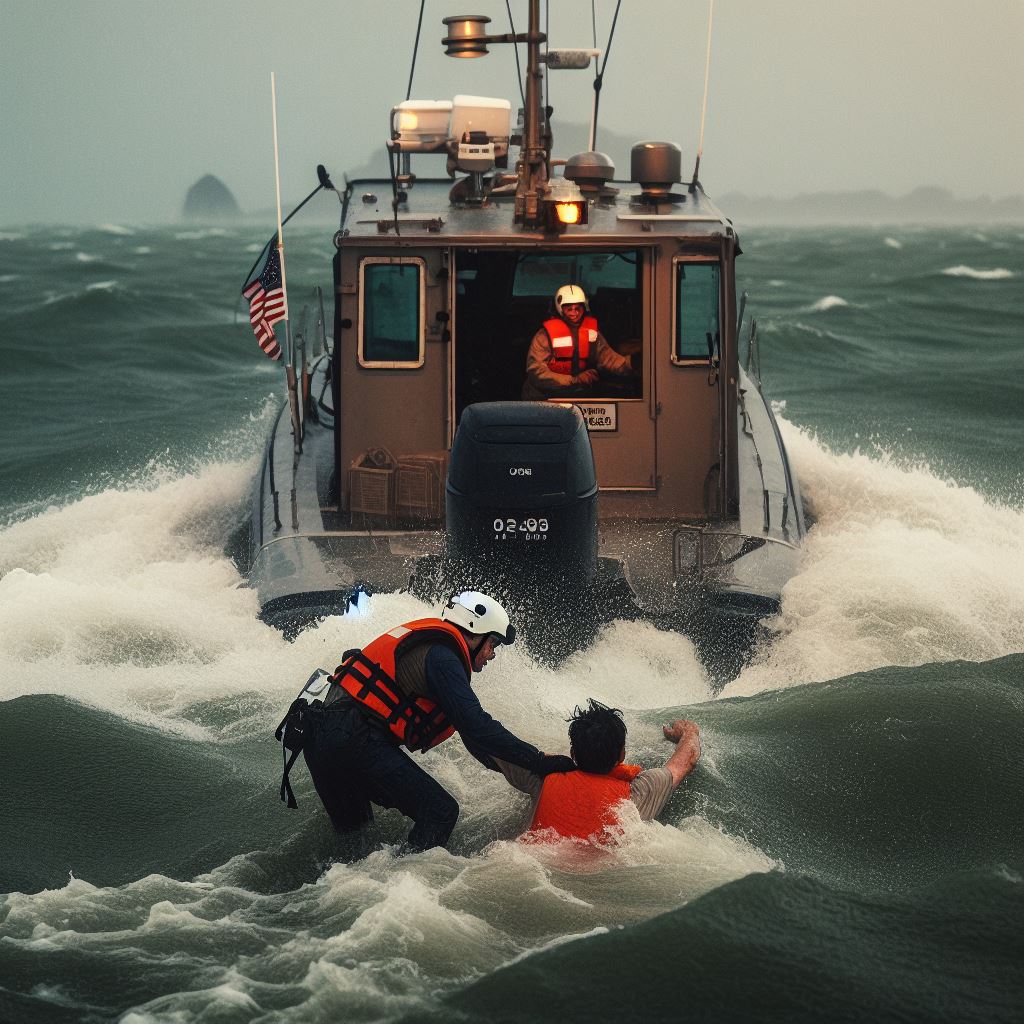Introduction
A. The U.S. Coast Guard and its Primary Mission
The U.S. Coast Guard is a vital branch of the military responsible for conducting sea rescues.
Their primary mission involves safeguarding mariners and conducting search and rescue operations.
B. Beyond Sea Rescues
However, the Coast Guard’s role extends far beyond sea rescues.
They actively engage in various critical tasks, such as:
- Law Enforcement: Enforcing maritime laws and ensuring security.
- Environmental Protection: Combating oil spills and preserving marine environments.
- Border Security: Safeguarding U.S. borders through coastal patrols and inspections.
- Humanitarian Aid: Providing disaster relief and support during emergencies.
This multifaceted organization plays a crucial role in protecting both maritime interests and the nation’s security, exhibiting versatility beyond the common perception of being solely sea rescuers.
History and Overview of the U.S. Coast Guard
A. Brief History of the Establishment of the Coast Guard
The U.S. Coast Guard, founded in 1790, boasts a rich history as one of the nation’s oldest maritime services.
Initially, it was known as the Revenue Cutter Service, primarily responsible for enforcing customs and trade laws, as well as safeguarding against piracy and smuggling.
B. Role of the Coast Guard within the Department of Homeland Security
Today, the Coast Guard operates under the Department of Homeland Security (DHS).
Its primary mission is to protect and secure the country’s coastlines and waterways, making it an integral component of national security.
The Coast Guard’s responsibilities extend far beyond sea rescues, encompassing activities such as search and rescue, law enforcement, environmental protection, and icebreaking.
C. The Coast Guard’s Motto: “Semper Paratus” (Always Ready)
“Semper Paratus” represents the Coast Guard’s unwavering commitment to being ‘Always Ready.’
This motto emphasizes their constant state of readiness to respond to emergencies, disasters, and threats, whether they occur on the high seas, inland waterways, or even in cyberspace.
It symbolizes the Coast Guard’s dedication to ensuring the safety and security of the United States.
The U.S. Coast Guard’s history is a testament to its unwavering dedication to protecting the nation’s maritime interests.
From its humble beginnings as the Revenue-Marine to its current role as a key component of the Department of Homeland Security, the Coast Guard has evolved to meet the changing needs of the nation.
The Coast Guard’s motto, “Semper Paratus,” underscores its commitment to readiness and its vital role in safeguarding American waters.
Whether responding to search and rescue missions, ensuring maritime security, or protecting the environment, the U.S. Coast Guard remains “Always Ready” to serve and protect.
Protection of U.S. Waters and Borders
In addition to their well-known role in sea rescues, the U.S. Coast Guard plays a crucial part in safeguarding U.S. territorial waters and protecting maritime borders.
This section will spotlight the Coast Guard’s role, emphasizing the defense of maritime borders from illegal activities.
It’ll showcase successful operations combating these threats.
A. Responsibility to Safeguard U.S. Territorial Waters
The Coast Guard is entrusted with the task of safeguarding U.S. territorial waters, which extend up to 12 nautical miles from the coastline.
This responsibility includes enforcing federal laws, preventing unauthorized access, and ensuring the safety and security of these waters.
Transform Your Career Today
Unlock a personalized career strategy that drives real results. Get tailored advice and a roadmap designed just for you.
Start NowBy actively patrolling these waters, the Coast Guard ensures compliance with fishing regulations, prevents illegal immigration, and intercepts any potential threats.
Their continuous presence acts as a deterrent, ensuring the integrity of U.S. territorial waters.
B. Importance of Protecting Maritime Borders
Protecting maritime borders is of paramount importance to national security.
The Coast Guard’s role in this endeavor is crucial, as illegal activities, such as drug smuggling and human trafficking, pose significant threats to the country.
Drug smuggling is a major concern, as it fuels addiction and crime rates, impacting communities across the nation.
The Coast Guard’s diligent efforts in intercepting drug shipments not only prevent the inflow of narcotics but also disrupt the financial networks of criminal organizations involved in the drug trade.
Similarly, human trafficking is a grave violation of human rights, and the Coast Guard plays a key role in identifying and rescuing victims.
Their operations aim to dismantle human trafficking networks and bring the perpetrators to justice.
C. Successful Coast Guard Operations in Combating Threats
The Coast Guard has a remarkable track record in successfully combating threats posed by drug smuggling and human trafficking.
Numerous operations stand as testimony to their dedication and effectiveness in protecting U.S. waters and borders.
- In Operation Martillo, the Coast Guard worked alongside international partners to disrupt illicit drug trafficking routes in the eastern Pacific Ocean and off the coasts of Central America.
This interagency operation led to multiple drug seizures and the apprehension of individuals involved in drug smuggling. - Another notable operation, called Panamax, focused on intercepting drug shipments in the transit zone between South America and the United States.
Through coordinated efforts, the Coast Guard intercepted vessels carrying large quantities of illicit drugs, considerably impacting the drug trade network. - Coast Guard efforts to combat human trafficking include Operation SOAR (Stop Obscene Acts on the Rivers), which targets traffickers who exploit victims for commercial sex.
By conducting regular patrols and investigations, the Coast Guard has successfully rescued victims and prosecuted offenders.
These examples demonstrate the effective role played by the Coast Guard in safeguarding U.S. territorial waters and protecting maritime borders from illegal activities.
Their steadfast commitment and professionalism contribute significantly to the overall security and well-being of the nation.
In essence, the U.S. Coast Guard extends its role beyond sea rescues to protect U.S. waters and borders.
With the responsibility to safeguard territorial waters and combat illegal activities, such as drug smuggling and human trafficking, the Coast Guard serves as a vital force in maintaining national security.
Read: Impact of COVID-19 on Security Guard Services in the United States
Maritime Security and Law Enforcement
The United States Coast Guard plays a pivotal role in enforcing maritime laws and regulations, ensuring the safety and security of our nation’s ports and waterways.
Their presence in these areas serves as a powerful deterrent against criminal activities, while their cooperation with other law enforcement agencies strengthens interagency operations.
A. Enforcing Maritime Laws and Regulations
- The Coast Guard operates under the Department of Homeland Security, responsible for enforcing federal laws and regulations that govern maritime activities.
- They have the authority to board and inspect vessels operating in U.S. waters to ensure compliance with safety, security, and environmental standards.
- Through routine patrols and surveillance, the Coast Guard monitors maritime traffic, identifying and intercepting vessels involved in illegal activities such as drug smuggling or human trafficking.
- Their role in enforcing maritime laws extends to protecting the marine environment by enforcing pollution prevention regulations and responding to oil spills and hazardous substance incidents.
B. The Significance of Coast Guard’s Presence in Ports and Waterways
- The Coast Guard maintains a strong presence in ports and waterways nationwide to deter criminal activities, safeguarding our nation’s vital infrastructure and economic interests.
- By conducting regular security patrols, they contribute to reducing the risk of maritime terrorism and piracy, ensuring the safety of vessels, crew, and cargo.
- Their collaboration with port authorities and industry stakeholders enhances security protocols, creates a seamless flow of commerce, and promotes international trade.
C. Coast Guard’s Participation in Interagency Operations
- The Coast Guard actively participates in interagency operations, working closely with other law enforcement agencies at the federal, state, and local levels to combat criminal threats in the maritime domain.
- They collaborate with agencies such as the Drug Enforcement Administration (DEA) and Immigration and Customs Enforcement (ICE) to disrupt illicit drug trade and prevent the unauthorized entry of individuals into the country.
- The Coast Guard’s integration into the Joint Interagency Task Force South (JIATF-S) further enhances their ability to counter drug trafficking in the Eastern Pacific and Caribbean regions.
- In line with their role in protecting national security, the Coast Guard supports the Department of Defense in maritime defense operations, providing necessary assistance during times of conflict or crisis.
All in all, the United States Coast Guard’s role goes far beyond sea rescues.
Their active involvement in enforcing maritime laws, maintaining a visible presence in ports and waterways, and working closely with other law enforcement agencies ensures the security and prosperity of our nation.
Through their dedication and vigilance, the Coast Guard upholds the rule of law and safeguards our maritime domain.
Read: Networking Opportunities for Security Professionals in the USA

Environmental Protection and Conservation
A. The Coast Guard’s Responsibility in Environmental Emergencies
The U.S. Coast Guard plays a vital role in responding to environmental emergencies, particularly oil spills.
They have dedicated teams and resources trained to swiftly respond to such incidents.
B. Preventing Pollution and Promoting Sustainability
Beyond responding to disasters, the Coast Guard is proactive in preventing pollution and ensuring sustainable maritime operations.
They enforce strict regulations on vessels and ports to reduce pollution and promote clean practices.
C. Protecting Marine Wildlife and Habitats
The Coast Guard’s commitment extends to marine wildlife and habitats.
They actively monitor and protect these ecosystems from harm, such as ship strikes and habitat destruction.
Their efforts help maintain a delicate balance in the maritime environment.
In summary, the U.S. Coast Guard’s mission goes far beyond sea rescues.
Their involvement in environmental protection and conservation is critical for safeguarding the seas and ensuring a sustainable future for marine life and ecosystems.
Transform Your Career Today
Unlock a personalized career strategy that drives real results. Get tailored advice and a roadmap designed just for you.
Start NowRead: Physical Fitness Standards and Tips for U.S. Security Guards
Search and Rescue Operations
When it comes to conducting search and rescue operations at sea, the U.S. Coast Guard plays a crucial role.
With their highly trained personnel and specialized equipment, they are able to carry out these missions effectively.
A. Acknowledge the Coast Guard’s primary role in conducting search and rescue operations at sea
- The U.S. Coast Guard is primarily responsible for conducting search and rescue operations at sea.
- They play a vital role in ensuring the safety and security of mariners in distress.
- Their quick response and efficient coordination are crucial in saving lives.
B. The highly trained personnel and specialized equipment used in these operation
- The Coast Guard’s search and rescue personnel undergo rigorous training to handle emergencies.
- They are equipped with advanced technology and tools to assist them in their operations.
- Their training includes helicopter rescues, swift water rescue techniques, and medical response.
C. Remarkable rescue stories and statistics to showcase the Coast Guard’s capabilities
- In 2019, the Coast Guard saved over 4,800 lives through search and rescue operations.
- Their efforts are not limited to maritime rescues; they also assist in inland search and rescue missions.
- One notable rescue involved the evacuation of 115 crew members from a sinking vessel.
- Another remarkable story is the rescue of two stranded hikers from a remote mountain area.
- The Coast Guard’s capabilities include night vision technology, rescue swimmers, and maritime patrol aircraft.
- They work closely with other agencies and organizations to ensure effective and coordinated operations.
Overall, the U.S. Coast Guard’s search and rescue operations at sea are vital for saving lives in distress.
Their well-trained personnel and specialized equipment enable them to respond quickly and efficiently.
Through remarkable stories and statistics, their capabilities and dedication to their mission are showcased.
Read: Veterans Transitioning to Security Roles: A Guide for the U.S. Market
Uncover the Details: Famous Real-Life Detectives and Their Legendary Cases
Support of Naval and Military Operations
The U.S. Coast Guard plays a crucial role in providing support to the U.S. Navy and other military branches.
During times of war, the Coast Guard has made significant contributions in various ways.
A. Providing Port Security
- The Coast Guard is responsible for ensuring the security of U.S. ports and harbors.
- They maintain a vigilant presence to protect the country’s critical maritime infrastructure.
- Through their efforts, they prevent unauthorized access, smuggling, and potential terrorist attacks.
- Port security is crucial for maintaining the flow of goods and resources in times of conflict.
B. Convoy Escort Duties
- During times of war, the Coast Guard provides escort services to protect merchant convoys.
- They accompany and safeguard vital supply ships, ensuring the delivery of essential resources.
- These escort duties help defend against enemy attacks and maintain the supply chain for military operations.
- The Coast Guard’s presence significantly reduces the risk of enemy interference and disruption.
C. Maritime Defense and Readiness
- The Coast Guard plays a crucial role in maritime defense and readiness.
- They maintain a constant state of readiness to respond to any threats or emergencies at sea.
- Their forces are equipped to protect U.S. waters, coasts, and territories from hostile actions.
- In times of war, the Coast Guard enhances the overall defense capability of the nation.
- They work in coordination with the Navy and other military branches to ensure comprehensive defense.
- Their expertise in coastal and maritime operations is invaluable for national security.
All in all, the U.S. Coast Guard extends its role beyond sea rescues by actively providing support to the U.S. Navy and other military branches.
During times of war, their contributions are vital in maintaining port security, performing convoy escort duties, and enhancing maritime defense and readiness.
Their commitment to protecting the nation’s ports, waters, and territories is critical for national security and the success of military operations.
Conclusion
The U.S. Coast Guard plays a critical and multifaceted role in safeguarding our nation’s coastline and maritime interests.
From conducting search and rescue missions to enforcing maritime law, their responsibilities are diverse and of utmost importance.
The Coast Guard’s primary duty is to ensure the safety and security of those at sea, responding swiftly and efficiently to all types of emergencies.
They conduct countless search and rescue operations, saving lives and providing aid to those in distress.
Furthermore, the Coast Guard plays a vital role in protecting our nation’s borders and preventing illegal activities, such as drug smuggling and human trafficking.
Their presence and enforcement efforts help to maintain the security of our coastal waters.
In addition to their operational responsibilities, the Coast Guard also has a crucial role in maintaining navigational aids and ensuring the safety of maritime transportation.
They work tirelessly to maintain buoys, lighthouses, and other navigational markers that guide vessels through our waterways.
The Coast Guard’s dedication to environmental protection is another significant aspect of their role.
They actively respond to oil spills and other environmental emergencies, ensuring the preservation of our natural resources and wildlife.
In the end, the U.S. Coast Guard is much more than just a sea rescue organization.
They are a vital force in protecting our nation’s maritime interests and ensuring the safety of those at sea.
Their various roles and responsibilities encompass search and rescue, law enforcement, border protection, navigational safety, and environmental protection.
Without the Coast Guard’s presence, our nation would be at a significant disadvantage in safeguarding our coastline and maritime territories.
[E-Books for Sale]
The Big Book of 500 High-Paying Jobs in America: Unlock Your Earning Potential
$19.99 • 500 High-Paying Jobs • 330 pages
Explore 500 high-paying jobs in America and learn how to boost your career, earn more, and achieve success!
See All 500 High-Paying Jobs of this E-Book
1001 Professions Without a Degree: High-Paying American Jobs You Can Start Now
$19.99 • 1001 Professions Without a Degree • 174 pages
Discover 1001 high-paying jobs without a degree! Unlock career tips, skills, and success strategies for just $19.99!




